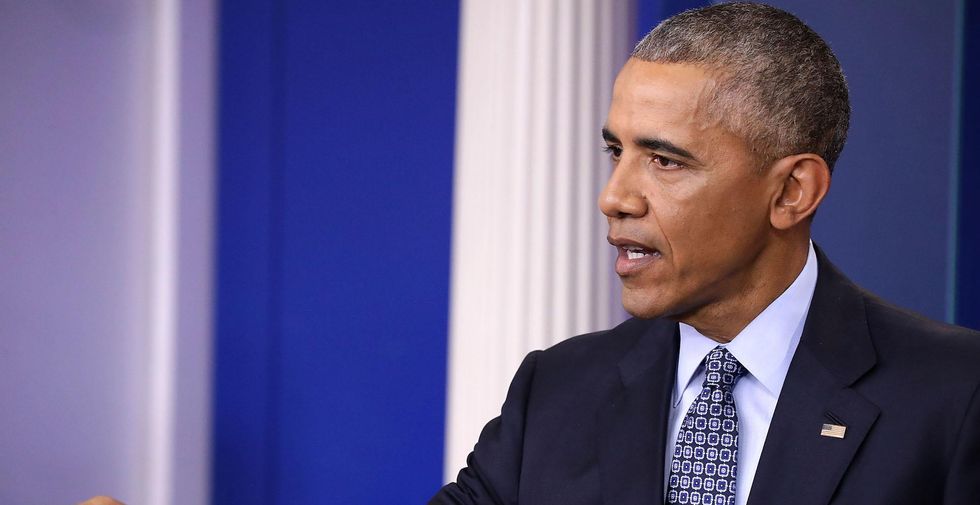
Chip Somodevilla/Getty Images

President Barack Obama's State Department, with just hours to go until it is overhauled by the incoming administration, announced Tuesday a half-a-billion-dollar contribution to the United Nations' Green Climate Fund.
"The Green Climate Fund is a critical tool that helps catalyze billions of dollars in public and private investment in countries dealing not only with the challenges of climate change, but the immense economic opportunities that are embedded in the transition to a lower carbon economy," State Department spokesman John Kirby said at a Tuesday press briefing, according to the Washington Post.
The Obama administration has promised to contribute $3 billion to the fund — a pledge that will surely come to an end when President-elect Donald Trump takes the oath of office Friday. On the campaign trial, Trump vowed to "cancel the Paris Climate Agreement and stop all payments of U.S. tax dollars to U.N. global warming programs."
This was the second $500 million infusion from the Obama White House. The first transfer came last March, bringing the total amount the U.S. has sent to the fund $1 billion, or one-third of the total amount promised. According to Kirby, the money sent to the UN came from unallocated monies in a 2016 appropriation for the State Department's $4.3 billion Economic Support Fund.
But, as the Post noted, $3 billion is just a drop in the bucket compared to what is expected by the year 2020:
Under the 2009 Copenhagen accord, developed nations are supposed to be allocating $100 billion annually on climate-change aid to poorer, developing nations, money to be used for clean energy projects and climate change adaptation measures, among other expenditures. Much, but not all of this money is intended to be distributed through the Green Climate Fund, which has already raised $10 billion so far.
It is worth noting that Republicans heavily criticized the White House when the president offered the first installment last year. In fact, Sen. John Barrasso (R-Wyo.) dubbed the contribution a payment to the "new international climate change slush fund," which he argued at the time was a waste of taxpayer dollars and in violation of a law that prohibits federal agencies from spending funds in advance or in excess of an appropriation.
"It appears to be the latest example of the administration going around Congress because the American people don’t really support what the president is doing with this initiative," the lawmaker said, adding, "I firmly oppose what the president is doing here and this misuse, I believe, of taxpayer dollars, I think is completely in violation of the law. The United States’ national debt currently is $19 trillion. We have struggling communities across this country in need of help."
While some may find it curious that the White House chose to squeeze this $500 million payment in on the heels of Trump's inauguration, Kirby said it is just a coincidence.
"This is an investment that had been long-planned. I don’t — I don’t believe there was any nefarious desire or intent to do it just two days before [the inauguration]," he explained.
Regardless, Trump and the Republican-led Congress could decide to block further payments moving forward. However, according to the Sierra Club's director of international climate policy, John Coequyt, that could create an awkward situation with other countries who have contributed to the fund.
While Trump has flatly rejected the Paris Agreement, his nominee for secretary of state, former ExxonMobil CEO Rex Tillerson, said during his confirmation hearing last week that he believes "the risk of climate change does exist" and "action should be taken." And in November, Exxon endorsed the Paris Agreement.
As for the international climate treaties of which the U.S. is a part, Tillerson, in contrast to Trump, said it is important to keep a "seat at the table."
"I think it’s important that the United States maintain its seat at the table in the conversation on how to address threats of climate change," he said. "They do require a global response. No one country is going to solve this alone."